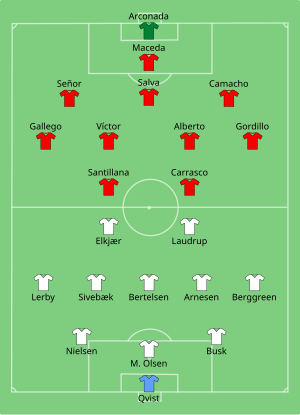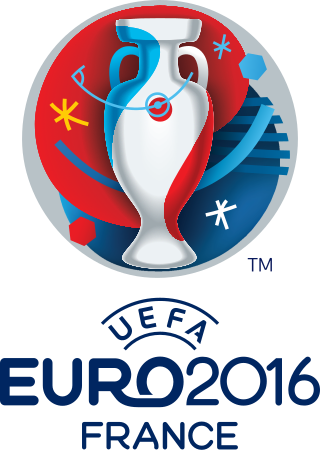Qualified teams
The top two placed teams from each of the two groups qualified for the knockout stage.
| Group | Winners | Runners-up |
|---|---|---|
| 1 | ||
| 2 |
The knockout stage of UEFA Euro 1984 was a single-elimination tournament involving the four teams that qualified from the group stage of the tournament. There were two rounds of matches: a semi-final stage leading to the final to decide the champions. The knockout stage began with the semi-finals on 23 June and ended with the final on 27 June at the Parc des Princes in Paris. France won the tournament with a 2–0 victory over Spain. [1]
All times Central European Summer Time (UTC+2)
Any game in the knockout stage that was undecided by the end of the regular 90 minutes was followed by thirty minutes of extra time (two 15-minute halves). If scores were still level after 30 minutes of extra time, there would be a penalty shootout (at least five penalties each, and more if necessary) to determine who progressed to the next round. For the first time at a European Championship, there was no third place play-off.
The top two placed teams from each of the two groups qualified for the knockout stage.
| Group | Winners | Runners-up |
|---|---|---|
| 1 | ||
| 2 |
| Semi-finals | Final | |||||
| 23 June – Marseille | ||||||
| 3 | ||||||
| 27 June – Paris | ||||||
| 2 | ||||||
| 2 | ||||||
| 24 June – Lyon | ||||||
| 0 | ||||||
| 1 (4) | ||||||
| 1 (5) | ||||||
France | Portugal |
|  |
| ||||||||||||||||||||||||||||||||||||||||||||||||||||||||||||||||||||||||||||||||||||||||||||||||||||||||||||||||||||||
Denmark | Spain |
|  |
| ||||||||||||||||||||||||||||||||||||||||||||||||||||||||||||||||||||||||||||||||||||||||||||||||||||||||||||||||||||||||||
France | Spain |
|  |
| ||||||||||||||||||||||||||||||||||||||||||||||||||||||||||||||||||||||||||||||||||||||||||||||||||||||||||||||||||||||||

The 1938 FIFA World Cup was the third edition of the World Cup, the quadrennial international football championship for senior men's national teams. It was held in France from 4 to 19 June 1938. Italy defended its title in the final, beating Hungary 4–2. Italy's 1934 and 1938 teams hold the distinction of being the only men's national team to win the World Cup multiple times under the same coach, Vittorio Pozzo. It would be the last World Cup until 1950; the 1942 and 1946 World Cups were cancelled due to World War II.

The 1984 UEFA European Football Championship final tournament was held in France from 12 to 27 June 1984. It was the seventh UEFA European Championship, a competition held every four years and endorsed by UEFA.

The 1960 European Nations' Cup was the inaugural tournament of the UEFA European Championship, held every four years and organised by UEFA. The first tournament was held in France. It was won by the Soviet Union, who beat Yugoslavia 2–1 in Paris after extra time.

The 2016 UEFA European Football Championship, commonly referred to as UEFA Euro 2016 or simply Euro 2016, was the 15th UEFA European Championship, the quadrennial international men's football championship of Europe organised by UEFA. It was held in France from 10 June to 10 July 2016. Spain were the two-time defending champions, having won the 2008 and 2012 tournaments, but were eliminated in the round of 16 by Italy. Portugal won the tournament for the first time, following a 1–0 victory after extra time over the host team, France, in the final played at the Stade de France.

The UEFA Euro 1984 final was the final match of Euro 1984, the seventh European Football Championship, UEFA's top football competition for national teams. The match was played at Parc des Princes in Paris, France, on 27 June 1984 and was contested by France and Spain. France qualified for the finals as hosts of the tournament, and faced Denmark, Belgium and Yugoslavia in the group stage before a victory over Portugal in the semi-final saw them progress to their first European Championship final. Spain ended top of their qualifying group, which included a 12–1 win over Malta, and progressed to UEFA Euro 1984 Group 2. There they played Romania, Portugal and West Germany, before defeating Denmark in the semi-final on penalties.
The knockout stage of UEFA Euro 1992 was a single-elimination tournament involving the four teams that qualified from the group stage of the tournament. There were two rounds of matches: a semi-final stage leading to the final to decide the champions. The knockout stage began with the semi-finals on 21 June and ended with the final on 26 June 1992 at the Ullevi in Gothenburg. Denmark won the tournament with a 2–0 victory over Germany.
The 1998 FIFA World Cup knockout stage covers the games from the second round through to the final at the 1998 FIFA World Cup in France. The top two teams from each of the eight groups qualified for the knockout stage. Teams played one game against each other, with the possibility of extra time and penalties if a winner could not be determined after 90 minutes.
The knockout stage of UEFA Euro 2000 started with the first quarter-final on 24 June and ended with the final on 2 July 2000.
The UEFA European Championship is the main football competition of the men's national football teams governed by UEFA. Held every four years since 1960, in the even-numbered year between World Cup tournaments, it was originally called the UEFA European Nations Cup, changing to the current name in 1968. Starting with the 1996 tournament, specific championships are often referred to in the form "Euro 2008" or whichever year is appropriate. Prior to entering the tournament all teams other than the host nations compete in a qualifying process.
The UEFA European Championship is the main football competition of the men's national football teams governed by UEFA. Held every four years since 1960, in the even-numbered year between FIFA World Cup tournaments, it was originally called the UEFA European Nations' Cup, changing to the current name in 1968.
Portugal have participated in eight editions of the UEFA European Championship, with an ongoing ninth appearance in 2024. Their first tournament was in 1984, and the side have advanced past the group stage in every edition they've participated in so far. Portugal have reached the semi-finals on five occasions, and reached the final as hosts in 2004, however losing to the heavy tournament underdogs Greece. They captured their first major tournament win after defeating hosts France 1–0 in the final of Euro 2016.
Austria have appeared in four editions of the UEFA European Championship: 2008, 2016, 2020, and 2024.
Romania have appeared at six UEFA European Championships between 1984 and 2024. Their best performance so far was reaching the quarter-finals of Euro 2000, when they were eliminated by eventual tournament runners-up Italy.
After the completed dissolution of Yugoslavia in 2006, the Serbia national team did not qualify for the next four UEFA European Championships it played qualifiers for, before finally securing a spot at Euro 2024. Its official predecessor teams Yugoslavia and FR Yugoslavia/Serbia & Montenegro were more successful: the team representing "larger" Yugoslavia became European vice-champions twice while the union of Serbia and Montenegro reached the quarter-finals at Euro 2000.
Northern Ireland have only qualified once for a UEFA European Championship, the 2016 edition. They directly qualified as group winners, and were already secured of qualification after the penultimate matchday. For the draw of the end stage that took place on 12 December 2015, they were seeded in Pot 4.
The knockout stage of UEFA Euro 2016 began on 25 June 2016 and ended on 10 July 2016 with the final in Saint-Denis, France, near Paris.

The UEFA Euro 2016 final was the final match of Euro 2016, the fifteenth edition of the European Football Championship, UEFA's quadrennial competition for national football teams. The match was played at the Stade de France in Paris, France, on 10 July 2016, and was contested by Portugal and France. The 24-team tournament began with a group stage, from which 16 teams qualified for the knockout phase. En route to the final, Portugal finished third in Group F, with draws against Iceland, Austria and Hungary. Portugal then defeated Croatia in the last 16 before beating Poland in the quarter-final after a penalty shoot-out. They progressed to the final after beating Wales in the semi-final. France finished the group stage as winners of Group A, beating Romania and Albania before drawing with Switzerland. In the knockout rounds, France defeated the Republic of Ireland and Iceland before beating Germany in the semi-final.
The knockout stage of UEFA Euro 1988 was a single-elimination tournament involving the four teams that qualified from the group stage of the tournament. There were two rounds of matches: a semi-final stage leading to the final to decide the champions. The knockout stage began with the semi-finals on 21 June and ended with the final on 25 June 1988 at the Olympiastadion in Munich. The Netherlands won the tournament with a 2–0 victory over the Soviet Union.
The final tournament of UEFA Euro 1972 was a single-elimination tournament involving the four teams that qualified from the quarter-finals. There were two rounds of matches: a semi-final stage leading to the final to decide the champions. The final tournament began with the semi-finals on 14 June and ended with the final on 18 June at Heysel Stadium in Brussels. West Germany won the tournament with a 3–0 victory over the Soviet Union.
The final tournament of the 1960 European Nations' Cup was a single-elimination tournament involving the four teams that qualified from the quarter-finals. There were two rounds of matches: a semi-final stage leading to the final to decide the champions. The final tournament began with the semi-finals on 6 July and ended with the final on 10 July at the Parc des Princes in Paris. The Soviet Union won the tournament with a 2–1 victory over Yugoslavia.